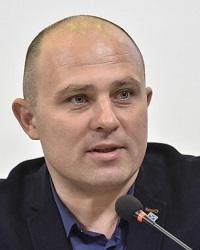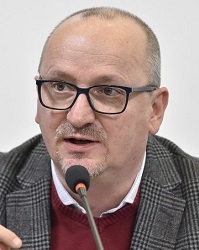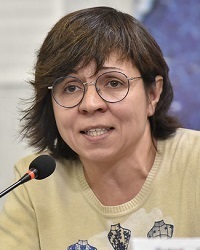Is there ideal structure of amalgamated hromada? Expert discussion abstracts
Is there an ideal structure for an amalgamated hromada? How does hromada capacity depend on the organisational structure? What is an effective organisational structure is for the urban / settlement / rural hromada? How to master modern management? These were the top topics when discussing the results of a study of an effective AH organisational structure and presenting the manual “Approaches to forming effective organisational structures for amalgamated hromadas”.
The participants discussed criteria for the formation of effective organisational structures of local self-government, presented study results, and offered recommendations for the implementation of modern management style, described in the manual.
You can watch the full video broadcast or read the discussion abstracts below.

 Andriy Klochko, Head of the Verkhovna Rada Committee on State Building, Local Governance, Regional and Urban Development
Andriy Klochko, Head of the Verkhovna Rada Committee on State Building, Local Governance, Regional and Urban Development
“We plan to complete the voluntary stage of the decentralisation reform by the new year. I hope all hromadsa will accept the responsibility to complete decentralisation and become masters on the ground.
I want to emphasise our support for the decentralisation reform, as well as our readiness to complete this process. The Committee has carried out appropriate analytical work, so the priorities will be determined and appropriate draft legislative acts developped in the near future.”

 Vyacheslav Nehoda, Deputy Minister of Development of Communities and Territories of Ukraine
Vyacheslav Nehoda, Deputy Minister of Development of Communities and Territories of Ukraine
"In order to provide quality service to people, the hromada must have at least adequate infrastructure. It is on the prospects of developing accessible infrastructure, on the ability of the hromada to assume powers, that we will focus completing creation of plans of capable hromadas that will form the basis of the new administrative and territorial structure. People should be able not only to form self-government bodies – elect an AH head and a local council – but also to effectively influence them, participate in difficult decision-making. I am sure we will create such opportunities. It is important that people have a desire to take advantage of them, so that they feel their responsibility for the future of their hromada, understand that it is no longer possible to put it to the shoulders of any impersonal authority from rayon, oblast or ministry, and that change must be made here, now and by each of us”.

 Volodymyr Kupriy, Deputy Head of the National Agency of Ukraine on Civil Service
Volodymyr Kupriy, Deputy Head of the National Agency of Ukraine on Civil Service
“New competencies are new challenges. If a local self-government body is given a high level of authority in the field of quality service assurance (social, educational, administrative, etc.), advanced training and professional development become the area of responsibility, first and foremost, of AH heads.
The National Agency of Ukraine on Civil Service creates conditions for training, attracts training organisations, universities, centres of advanced training. "

 Barry Reed, USAID DOBRE Programme Director
Barry Reed, USAID DOBRE Programme Director
“Hromadas need to change in particular in their structure. Decentralisation gives more opportunities, but also powers, responsibilities. Many hromadas are formed, as it was 6 years ago, before decentralisation. But this starts to change. I hope today's meeting will lead to more changes.
For DOBRE Programme partner hromadas everything starts with the strategy of who you are, who you want to be, and how you organise yourself.”

 Oleksandr Korinnyi, President of the AH Association, head of the Novoukrayinska AH
Oleksandr Korinnyi, President of the AH Association, head of the Novoukrayinska AH
“In councils with many employees there is a belief that only the council changes something in the hromada. And in hromadas with smaller number of personnel most of the work is done by self-organising bodies in the form of public organisations, methodological associations. That is, the council needs to determine the strategy, priorities, and put the “checkboxes” where we need to go tomorrow, and people have to do it, so you don't need to have 35 specialists in the economic department, since that doesn't make the entrepreneur or the factory work better.”

 Krzysztof Gluck, Director of the Malopolska School of Public Administration, Krakow University of Economics (MSAP / UEK)
Krzysztof Gluck, Director of the Malopolska School of Public Administration, Krakow University of Economics (MSAP / UEK)
“There is no perfect structure. We are just trying to build something perfect, but there is always something that needs to be changed. If you think about changing the comfort of people's lives, you have to consider improving the quality of management. Money is just a tool – that's not the goal. In Poland, we we have many examples of communities with lots of money and poor management, and vice versa – poor communities with excellent management.
International donor assistance programmes will sooner or later go away and communities will remain. And they will be able to work with those professional development institutions that remain.”

 Natalia Hnydyuk, expert on institutional capacity of hromadas
Natalia Hnydyuk, expert on institutional capacity of hromadas
“There is no such thing as a “model organisational structure”, since every AH, every local self-government body can have its own ideal structure, which is inherent in this very local self-government. This is due to various factors.
When building the organisational structure, we need to be mindful of the people we will need. I mean the notion of categorisation – that is, what category of specialist will be important to the structure: a leading specialist, chief specialist or inspector, provided with the necessary functions.”
The manual “Effective organisational structures for amalgamated hromadas” CAN BE DOWNLOADED HERE.
The full version is available in Ukrainian – please click HERE
27 February 2026
4 березня – онлайн-лекція «Емоційний інтелект: як управляти емоціями?»
4 березня – онлайн-лекція «Емоційний інтелект:...
4 березня 2026 року о 14:30 відбудеться безоплатна онлайн-лекція «Емоційний інтелект: як управляти емоціями?» для...
27 February 2026
Language of Development Part 3: Institutions Behind EU Cohesion policy
Language of Development Part 3: Institutions...
“Language of development” is a shared voice of many — from key EU institutions to the governments of Member States,...
27 February 2026
Адміністрування податків громадами: Мінрозвитку запускає експеримент
Адміністрування податків громадами: Мінрозвитку...
Міністерство розвитку громад та територій ініціювало експериментальний проєкт, який дозволить територіальним громадам...
27 February 2026
Мінрозвитку підготував проєкт Постанови щодо...
Міністерство розвитку громад та територій України напрацювало проєкт Постанови Кабінету Міністрів «Про пріоритети...